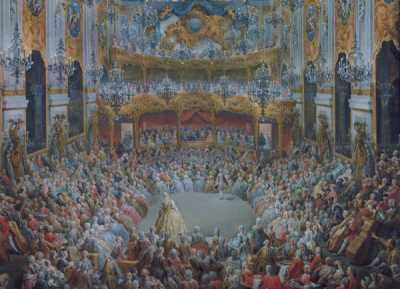The Ball
Pleasure - Power - Politics
1600 - 1900
The ball, a universal social phenomenon, whether at princely courts, civic festivities or private celebrations, has many new facets across the centuries.
Dedicated to the pleasures of dance in multifarious forms and styles, the ball is also an arena for displays of princely power, staged rituals, carefully regulated forms of social contact, and advantageous self-representation. Not least, the ballrooms of Europe reflect the continent’s political and societal developments, their evolutions and revolutions.
Our journey through three centuries of dance history not only leads us to the ballrooms of Vienna, Dresden and Moscow, but also illustrates the transfer of dance culture across the whole of Europe. We trace the lives of dancing masters who once drew crowds to the ballrooms and explore the various manifestations of balls on stage.
In addition to lectures, the symposium includes workshops and dance evenings, in which the most popular ball dances, such as minuet, allemande, contredanse and quadrille, evoke the atmosphere and sensibility of these epochs.
Conference languages are English and German. This time with simultaneous translation into English and German!
RESEARCH DANCE - DANCE RESEARCH: Our central goal is to bring together dancers and researchers and thus enable intensive interaction between the latest research and current dance practice.
- A series of lectures presents the present status of dance research.
- Workshops give an opportunity to try out new dance styles and reconstructions.
- Short performances demonstrate current artistic interpretations.
- A bookshop offers a wide range of literature and music relating to dance.
- Social dance evenings with live music help make a variety of new contacts.
- A celebratory ball with costumes of the period represents the culmination of the conference.
- Sharing leisure and programme together in the castle enables a time of especially intensive contact.
Lectures: Giles Bennett - Hillary Burlock - Eugenia Eremina-Solenikova - Matilda Ertz - Maria Cristina Esposito - Dmitry Filimonov - Carola Finkel - Rebecca Harris-Warrick - Gerrit Berenike Heiter - Birte Hoffmann-Cabenda - Michaela Mettel - Nona Monahin - Angela Rannow - Daria Sundukova - Eva Zöllner
Research Posters: Maria Derkach - Maria Cristina Esposito - Dmitry Filimonov - Susan de Guardiola - Alan Jones - Michaela Mettel - Ekaterina Mikhailova-Smolniakova - Daniele Pascale Guidotti Magnani - Bill Tuck - Davide Vecchi
Workshops: Anne Daye - Irène Feste - Dmitry Filimonov - Susan de Guardiola - Hubert Hazebroucq - Rostislav Kondratenko - Guillaume Jablonka
Dance evenings: Anne Daye - Alan Jones - Barbara Menard-Pugliese - Antonia Pugliese
Short performances: Chorea Basilea (dir. Mojca Gal) - Cie Fantaisies Baroques (dir. Irène Feste, Pierre-François Dollé) - LA DANZA MÜNCHEN (dir. Jadwiga Nowaczek)
Scientific committee: Dr. Irene Brandenburg (Salzburg, Österreich), Dr. Anne Daye (London, Großbritannien), Prof. em. Carol G. Marsh (Washington, USA), Prof. em. Marie Thérèse Mourey (Paris, Frankreich), Markus Lehner (Herrsching, Deutschland)
Organisation: Markus Lehner, Uwe Schlottermüller
For extensive information on the conference, see: www.historical-dance-symposium.org
